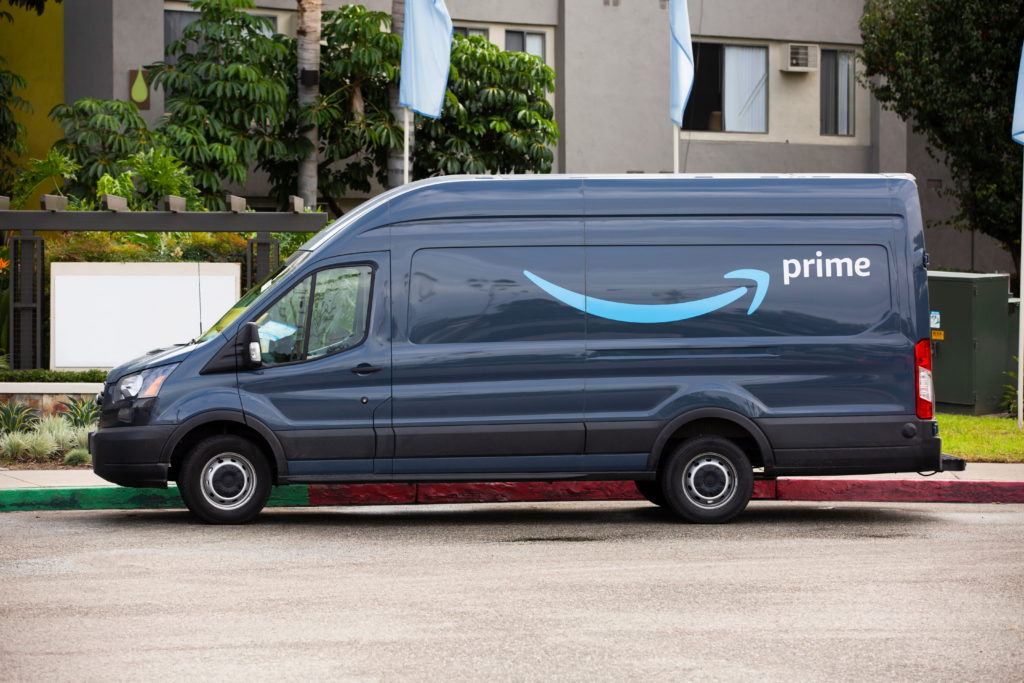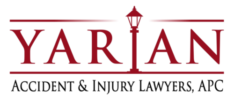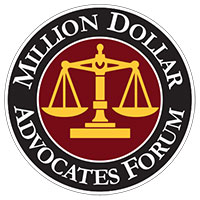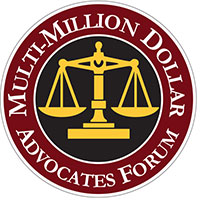Accidents with delivery trucks in Los Angeles often cause catastrophic injuries because of the size and weight of the truck. You or a loved one should contact a Los Angeles truck accident lawyer as soon after the accident as possible for several reasons, including evidence gathering and working with insurance companies that often have short deadlines for filing claims.
The sooner you contact a truck accident attorney, the better—since evidence tends to disappear after an accident. Factors such as weather and even the defendant can destroy evidence.

At the Accident Scene
If you can move without additionally injuring yourself:
- Check on other drivers and call first responders.
- Take photos of the accident scene from all directions. Be sure to take pictures of the damage to the road and nearby property, including mailboxes, utility poles, yards, fences, trees, and other items damaged in the wreck.
- Ask the delivery truck driver for their license, registration, and insurance information, including the driver’s CDL and regular license. If possible, take pictures of the documents, but make sure the information is clear.
- Ask witnesses for their contact information. You can also ask them what they saw.
- Allow emergency medical technicians to check you over, even if you believe your injuries are minor.
- Give the police officer your version of what happened.
After the police officer releases you from the scene, seek medical attention immediately, even if you believe your injuries are minor, and the emergency medical technicians check you over at the scene. Some injuries do not manifest for hours or even days later.
If you cannot take any action, contact a Los Angeles attorney as soon as possible. You can also have a loved one contact a truck accident attorney on your behalf.
Why You Must Contact a Los Angeles Truck Accident Attorney
You will need to notify the insurance company that you were in a wreck. However, a Los Angeles truck accident lawyer should file a claim for you. Insurance companies are in business to make money. Every claim they pay out puts a dent in their bottom lines, which means less money for them. They could try anything to get out of paying a claim and, barring that, may try to get you to accept an offer that is nowhere near fair and reasonable.
One of the tricks the insurance company uses is to get you to talk about the accident. They then twist what you say to blame you for the accident.
Another trick is that they admit their client is at fault but will say they can only offer a small amount of money. They convince people that there is no more money available, hoping that you will accept the amount they proffer.
If you contact the insurance companies, only give them your name and contact information, the date and location of the accident, and your attorney’s contact information. If you have not yet found an attorney, let the insurance company know that the firm will contact it as soon as you retain an attorney.
Truck Accident Injuries
Because of the size and weight of a delivery truck, accident injuries are often severe or catastrophic. This type of accident also has a higher chance of causing death.
Accident injuries could include:
- Bumps, bruises, cuts, scrapes, and scratches.
- Road rash.
- Face and eye injuries.
- Ear injuries, including deafness, if a vehicle blows up.
- Head, neck, and shoulder injuries.
- Traumatic brain injuries.
- Simple and compound fractures.
- Crushed bones and other crush injuries.
- Strains and sprains.
- Pulled and torn muscles and other soft tissue injuries.
- Back and spinal cord injuries.
- Thermal and chemical burns.
- Internal injuries.
- Amputation of a digit or limb.
An accident victim could also suffer from secondary injuries, such as an infection from an open wound. Accident injuries could also exacerbate existing injuries or conditions. The at-fault driver is also responsible for these injuries as you would not have sustained the additional pain and suffering, medical expenses, and other damages if not for the defendant’s actions or inactions.
Since it does take a while to receive a settlement or a trial award, you might wonder how you will pay bills, cover medical expenses, and pay the mortgage or rent if you cannot work. You can use your automobile insurance and health insurance to cover most of your expenses. Some car insurance policies will even pay for lost wages.
For medical expenses the insurance companies do not cover, your truck accident attorney can draft a letter requesting that the medical professionals halt collections and do not report to credit agencies until your case closes.
When you receive your settlement or trial award, you will have to pay outstanding medical expenses and reimburse your insurance company since they should not take a loss because of someone else’s negligence.
Recovering Damages After an Amazon and Delivery Truck Accident
After an Amazon and delivery truck accident, you could recover economic and non-economic damages.
Economic Damages
Special damages, often referred to as economic damages, have a monetary value—they are actual costs that come out of your pocket or an insurance company’s pocket. The court orders the at-fault driver to pay economic damages as an attempt to make you whole again.
Economic damages include:
- Medical expenses, including doctors’ appointments, surgeries, follow-up appointments, prescriptions, ambulatory aids, occupational therapy, psychological therapy, physical therapy, cognitive therapy, home health care, expenses for a rehabilitation center or nursing home, hand controls for your vehicle, and updates to your home, such as wheelchair ramps, handrails, grab bars and widened doorways.
- Lost income and loss of future earning capacity. If you suffer long-term or permanent injuries or lost a loved one in an Amazon and delivery truck accident, you could recover lost income until you (or your deceased loved one) would normally retire.
- Compensation to repair or replace damaged or destroyed personal property, including your vehicle and anything of value inside the vehicle, such as a cell phone or laptop.
- Death-related expenses, including funeral and burial expenses, cremation expenses, certain probate court expenses, and the cost of a probate attorney.
Non-Economic Damages
General damages, often referred to as non-economic damages, do not have a monetary value but are still considered compensatory damages. No one can put a price on the injuries you suffer, nor can anyone bring back a loved one. The court orders the at-fault driver to pay non-economic damages in an attempt to make you whole again.
Non-economic damages include:
- Pain and suffering, including emotional distress.
- Loss of quality of life if you have to make life-long changes, such as taking prescriptions or using ambulatory aids for the rest of your life.
- Loss of consortium if you can no longer have a physical relationship with your spouse or lost your spouse in a delivery truck wreck.
- Loss of companionship if you can no longer enjoy time with the family, including attending family outings, activities, and events.
- Loss of use of a body part, such as your arm or hand.
- Loss of use of a bodily function, such as your eyesight, hearing, or bladder.
- Inconvenience if you have to hire someone to do the chores you usually do, such as grocery shopping, house cleaning, lawn maintenance, and home repair and maintenance.
- Disfigurement and excessive scarring.
- Amputation of a digit and/or limb.
Settling After an Amazon and Delivery Truck Accident
Once a truck accident attorney investigates the case, they will send a demand letter to the insurance company or companies involved. In accidents with commercial trucks, more than one defendant could be responsible for your damages, including the driver, the trucking company, a truck manufacturer, auto repair technician, inspector, or dispatcher.
The attorney will send the appropriate demand letters to all insurance companies involved. The demand letter includes an amount that you and the attorney think is fair and reasonable based on your injuries, expenses, and other losses.
The demand letter also gives the insurance company a set time to respond. A standard time is ten working days. The insurance company may accept the demand, deny it, or forward a counteroffer to start settlement negotiations. Each side has a specific number of days to respond. Negotiations could take a few weeks to a couple of months or longer.
You can remove yourself from settlement negotiations at any time and file a court case. If you believe the insurance company will not offer a fair and reasonable settlement or if the insurance company denies the claim, your attorney will let you know if they believe filing a court case is the better option.
Going to Trial After a Delivery Truck Accident
The insurance company does not want to go to court in most cases. Litigating a truck accident case is expensive, and if you win, the insurance company pays your attorney and its own attorneys. Even if you have to stop settlement negotiations and file a lawsuit, you could still settle. The insurance company could decide that a higher amount is fair and reasonable rather than going to trial.
Trials can last for several months or even over a year, depending on how hard the insurance company fights. While your attorney cannot guarantee an outcome, many insurance companies settle months into a trial because they worry the jury will order them to pay more than what you would accept for an offer, especially if the defendants’ actions or inactions caused severe or catastrophic injuries or death, or if the defendants were grossly negligent.
Receiving Compensation After a Delivery Truck Accident Settlement

Once you win a settlement or a jury trial award, the case still has several steps to go through.
One of the attorneys drafts a settlement agreement or a final judgment. It is usually the losing side since they will have to pay attorneys’ fees and costs. The attorney who drafts the agreement or proposed final judgment forwards it to the plaintiff’s attorney for their and their client’s review.
If you or your attorney need to make changes, the attorney will contact the defendant’s lawyer and request changes. If they agree, the defendants’ attorneys make the changes, then forward the amended agreement or proposed final judgment to the other attorney and their clients for review.
If both are satisfied with the content of the settlement agreement, you sign the agreement, and your attorney forwards it back to the defendants’ attorneys for their clients’ signatures.
If the document is a proposed final judgment, the attorney forwards the document to the court for the judge’s signature. The judge will review the proposed final judgment to ensure that it is in line with what they ordered. Once the judge executes the order, they send the final judgment to the clerk and attorneys on both sides.
Once the legal documentation is complete, the insurance company (or companies) cut a check to your attorney, who then deposits the check into an escrow account.
Your attorney must wait until the check clears the bank before they can take the next step. This process could take up to 14 days, depending on the check amount.
After the check clears, your attorney:
- Pays any outstanding medical bills and other expenses related to the accident injuries.
- Reimburses your health and automobile insurance companies if you used them to cover medical expenses and lost income until you received your settlement.
- Deducts their fees and costs according to the contingency agreement you signed when you retained the firm.
- Cuts a check to you and mails it to you or wires the amount to your bank.
Once the check clears or the wire hits the bank, you can spend the money as you see fit.
If you suffered injuries or lost a loved one in an Amazon and delivery truck accident, contact a Los Angeles truck accident lawyer for a free case evaluation.









